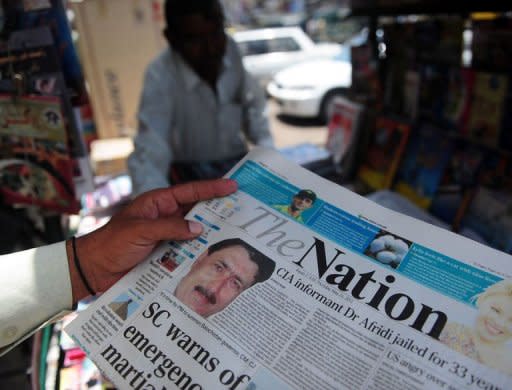US lawmakers eye Pakistan aid freeze over doctor row
Angry US lawmakers Thursday threatened to freeze millions of dollars in vital aid to Islamabad after a Pakistani doctor who helped hunt down Osama bin Laden was jailed for 33 years. As the case of Shakeel Afridi, also fined 320,000 rupees ($3,500) after being found guilty of treason, stunned Capitol Hill, US Secretary of State Hillary Clinton denounced his treatment as "unjust and unwarranted." "We regret both the fact that he was convicted and the severity of his sentence," Clinton told reporters. Troubled ties between the United States and Pakistan have not recovered since they sank to all-time lows after the killing of bin Laden by US commandos in a raid on his compound in the garrison town of Abbottabad in May 2011. Relations frayed further when US air strikes killed 24 Pakistani soldiers in November, causing Pakistan to shut its Afghan border to NATO supply trucks. The Afridi sentencing was announced just two days after US President Barack Obama appeared to snub Pakistani President Asif Ali Zardari at a NATO summit over Islamabad's refusal to lift the blockade on the vital transit routes. The action of Afridi -- who had run a fake vaccination program designed to collect the DNA of the Al-Qaeda leader's family -- to "bring about the end of the reign of terror designed and executed by bin Laden was not, in any way, a betrayal of Pakistan," Clinton said. Afridi had been "instrumental in taking down one of the world's most wanted murderers. That was clearly in Pakistan's interest, as well as ours and the rest of the world's," Clinton said. US lawmakers threatened to suspend the aid to Islamabad until Afridi is freed, the Pakistani government ends support for terror groups and re-opens Afghan supply routes. The United States has given Pakistan more than $18 billion in assistance since Al-Qaeda orchestrated the September 11, 2001 attacks, but US officials have persistent concerns that some elements of the establishment have maintained support for extremists. "All of us are outraged at the imprisonment and sentence of some 33 years, virtually a death sentence, to the doctor in Pakistan," Senator John McCain told reporters. A Pakistani official told AFP that Afridi, who worked for years as a government surgeon in the lawless tribal district of Khyber, now appeared "weak" and "depressed" at the central prison in the northwestern city of Peshawar where he is being held. "Doctors prescribed some medicine, which was immediately provided. He will remain under medical observation inside the jail," the official told AFP, asking to remain anonymous. In a sign of mounting anger, the Senate Appropriations Committee voted 30-0 to freeze a symbolic $33 million in foreign aid to Pakistan, or $1 million for each year of the sentence, in an amendment to the $52 billion US foreign aid budget. "We need Pakistan, Pakistan needs us, but we don't need Pakistan double-dealing and not seeing the justice in bringing Osama bin Laden to an end," said Republican Senator Lindsey Graham. The mammoth appropriations bill, which includes a total of $1 billion in assistance for Pakistan, will go now to the Senate floor. It represents a 58 percent cut in the amount of aid Obama had requested for Pakistan. "He is not a spy, I can tell you," said Dianne Feinstein, who chairs the Senate Intelligence Committee. "If this is how Pakistan is going to treat a friend and hero, I don't know about these funds." McCain and others in the Senate Armed Services Committee doubled down later in the day, voting for a sweeping $631.4 billion defense spending bill for the coming fiscal year which freezes about $1 billion in military aid to Pakistan used to offset the costs of its support for the US-led coalition. "Before the government of Pakistan can be reimbursed using coalition support funds... the secretary of defense is going to have to certify that Pakistan is open and maintaining lines of supply; is not supporting militant extremist groups such as the Haqqani network; and is not detaining or imprisoning citizens of Pakistan," McCain said. He also said that Pakistan's linkage of Afridi's jailing to its demand for an apology for the US air strike in November is "beyond ludicrous." The defense bill likely goes to the Senate floor in June or perhaps July, said Senator Carl Levin, the committee's Democratic chair.



